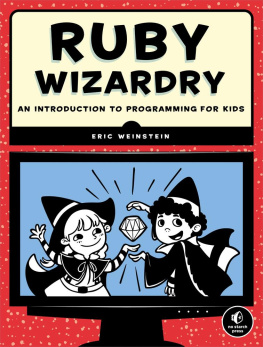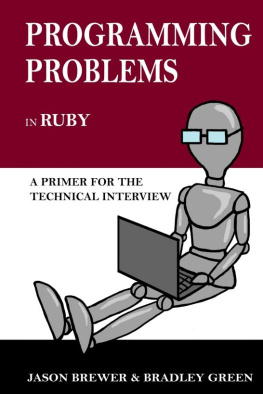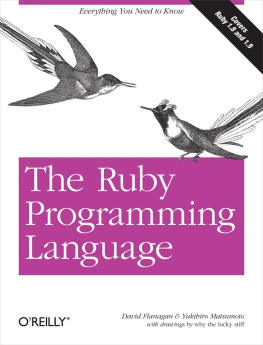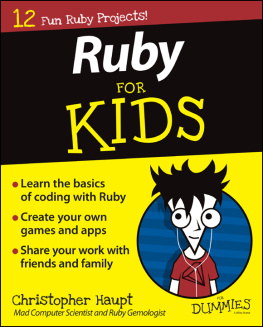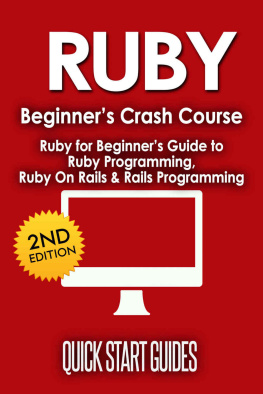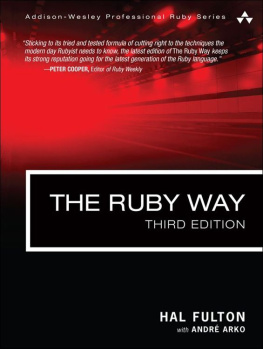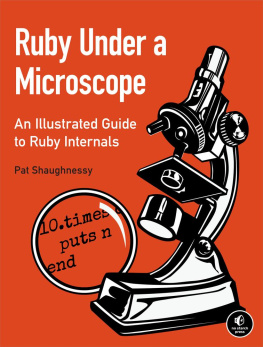Eric Weinstein - Ruby Wizardry: An Introduction to Programming for Kids
Here you can read online Eric Weinstein - Ruby Wizardry: An Introduction to Programming for Kids full text of the book (entire story) in english for free. Download pdf and epub, get meaning, cover and reviews about this ebook. year: 2014, publisher: No Starch Press, genre: Children. Description of the work, (preface) as well as reviews are available. Best literature library LitArk.com created for fans of good reading and offers a wide selection of genres:
Romance novel
Science fiction
Adventure
Detective
Science
History
Home and family
Prose
Art
Politics
Computer
Non-fiction
Religion
Business
Children
Humor
Choose a favorite category and find really read worthwhile books. Enjoy immersion in the world of imagination, feel the emotions of the characters or learn something new for yourself, make an fascinating discovery.
- Book:Ruby Wizardry: An Introduction to Programming for Kids
- Author:
- Publisher:No Starch Press
- Genre:
- Year:2014
- Rating:4 / 5
- Favourites:Add to favourites
- Your mark:
- 80
- 1
- 2
- 3
- 4
- 5
Ruby Wizardry: An Introduction to Programming for Kids: summary, description and annotation
We offer to read an annotation, description, summary or preface (depends on what the author of the book "Ruby Wizardry: An Introduction to Programming for Kids" wrote himself). If you haven't found the necessary information about the book — write in the comments, we will try to find it.
Ruby Wizardry is a modern day fairy tale that teaches programming skills kids can use.
Ruby Wizardry: An Introduction to Programming for Kids — read online for free the complete book (whole text) full work
Below is the text of the book, divided by pages. System saving the place of the last page read, allows you to conveniently read the book "Ruby Wizardry: An Introduction to Programming for Kids" online for free, without having to search again every time where you left off. Put a bookmark, and you can go to the page where you finished reading at any time.
Font size:
Interval:
Bookmark:
To my teachers
Eric Weinstein has helped millions of people learn to program through Codecademy, where he designed and authored the Ruby curriculum and contributed courses on Python, JavaScript, HTML/CSS, and PHP. He has also taught creative writing to undergraduates and veterans of the wars in Iraq and Afghanistan at New York University, where he was a Veterans Writing Workshop Fellow. He writes Ruby for a living in New York City.
Peter Cooper is the editor of Ruby Weekly , a chair of OReillys Fluent web development conference, and the author of Beginning Ruby (Apress). He tweets at @peterc.
Pat Shaughnessy is the author of Ruby Under a Microscope (No Starch Press) and also blogs at http://patshaughnessy.net/ . A fluent Spanish speaker, Pat frequently visits his wifes family in northern Spain. Pat lives outside of Boston with his wife and two children.
A long time ago, I was a little kid growing up on a farm in rural Pennsylvania. My hometown is small enough that my parents farm was just half a mile down the road from my maternal grandparents house, my mothers childhood home.
One day, when I was seven years old, I was visiting my grandparents. It just so happened that one of my uncles also dropped by on that particular day. He wanted to give my grandparents a present: their first computer, a Mac Plus.
You see, my uncle was heavily involved in all kinds of computing shenanigans. And computers were still a new thing in those days, so not many people had them. My grandparents, caring about their son and his interests, decided it would be a good idea to check out this whole computer thing.
Excited by all the hubbub, my uncle called me over to the computer and explained what it was. He told me that you could do all kinds of things with computers, but that he thought I might like this one. On the screen appeared these immortal words:
Welcome to ADVENTURE! Original development by Willie Crowther Major features added by Don Woods Conversion to BDS C by J. R. Jaeger Unix standardization by Jerry D. Pohl Conversion to PHP by Matt G. S. Cox Adapted for AMC.com by Rick AdamsTo play the game, type short phrases into the command line below.If you type the word "look," the game gives you a description ofyour surroundings. Typing "inventory" tells you what you'recarrying. "Get" "drop" and "throw" helps you interact withobjects. Part of the game is trying out different commands andseeing what happens. Type "help" at any time for gameinstructions.Would you like more instructions? noYou are standing at the end of a road before a small brickbuilding. Around you is a forest. A small stream flows outof the building and down a gully.What's next?Then, just a blinking cursor. By typing in simple instructions, I was able to explore a wonderful world, with an endless cave, a sneaky pirate, and a maze of twisty little passages, all alike. I was absolutely enthralled. My uncle told me, offhandedly, that some people called programmers had to actually teach the computer know how to play the game. I was hooked. I started asking to go see Grandma so much that my parents started saying, You dont want to see Grandma, you want to play with Grandmas computer.
No, I want to see Grandma and play with her computer, I replied.
Today, computers are very different. That Mac Plus had an 8 MHz processor, which could handle 1.4 million instructions per second. It also had 1MB of RAM. An iPhone 5s, today, has a 1.3 GHz processor, which can handle 18200 million instructions per second, and has 1GB of RAM. Games today dont present you with some text; they present you with full 3D graphics.
But I still firmly believe that a computer can change a childs life.
Ruby Wizardry is a book that captures that wonder I had as a child, sitting at this thing they called a keyboard for the first time. Ruby is a much nicer programming language than the GW-BASIC I cut my teeth on, but the core idea is the same. Give a child a way to bring their imagination to life, and amazing things will happen.
I hope Ruby Wizardry brings you the same joy that computers have always brought me.
Steve Klabnik
This book would not have been possible without the tireless efforts of dozenspossibly even dozens of dozens!of people.
First, my wife, Laura, who not only tolerated my all-night writing sessions and endless requests for feedback on story ideas, but also at various times pinch hit as literary agent, proofreader, sanity checker, and stop-reading-the-Internet-and-get-back-to-work!-er. This book would never have come to be without her love and support.
My family, especially my father, who read to me almost every night for years, and my mother, who (for better or worse) taught me that I could do anything to which I stubbornly committed myself.
My teachers, to whom this book is dedicated, particularly my teachers in the Ruby community: Cole Brown, Linda Liukas, and Dean Strelau, as well as all the brilliant, dedicated facilitators and students at Hacker School.
Of course, Ruby Wizardry would not have been possible without Tyler Ortman, Riley Hoffman, Bill Pollock, and the amazing people at No Starch Press. I literally cant thank them enough for their insight, energy, and dedication.
Steve Klabnik, who read an early version of this book and wrote a wonderful foreword for it, as well as Peter Cooper and Pat Shaughnessy, who did the technical review and gave me much greater insight into the nitty-gritty of the Ruby language. All three are phenomenal teachers and Rubyists.
why the lucky stiff, whose book whys (Poignant) Guide to Ruby was one of the first Ruby books I read and who was the first to really show me the significance of and enthusiasm for art in the language and the community. I hope this book evokes some of the same feelings of excitement and wonder I felt when reading whys work.
Finally, Dave, who introduced me to Bill at No Starch Press and made this whole thing possible.

You found this book! Okay, awesome. I was really hoping it would get to you.
Imagine someone tells you hes discovered a new way of writing. Not a new language, like French or Japanese or Elvish, but a whole new kind of writing that makes your stories actually happen . If you described a maze, people could enterand get lost inthat maze. If you wrote about a faraway planet where robot pirates fought ninja wizards, that planet would totally exist. Not only that, but you could write dialogue like "Beep boop shiver me circuits" or cast spells like ninja_wizard.throw_flaming_ninja_stars. Crazy, right? And thats probably exactly what youd say: that this is completely crazy and whoever thought of it has too much time on his hands. Too much imagination.
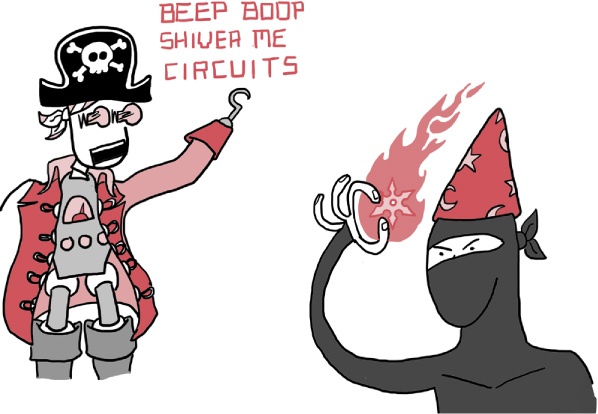
Well, it turns out theres no such thing as too much imagination. So! Imagine me this: not only is this crazy new way of writing real , but you can learn how to do it. You could, with a little practice, figure out how to make your own worlds with your own rules. Youd be in charge, and you could do pretty much anything you could think of. Not only that, but if you got really good at it, people would come from all over to experience the worlds you built and use all the amazing things you created.
Font size:
Interval:
Bookmark:
Similar books «Ruby Wizardry: An Introduction to Programming for Kids»
Look at similar books to Ruby Wizardry: An Introduction to Programming for Kids. We have selected literature similar in name and meaning in the hope of providing readers with more options to find new, interesting, not yet read works.
Discussion, reviews of the book Ruby Wizardry: An Introduction to Programming for Kids and just readers' own opinions. Leave your comments, write what you think about the work, its meaning or the main characters. Specify what exactly you liked and what you didn't like, and why you think so.

